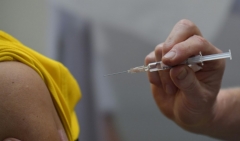
(Getty Images)
(CNS News) — A new survey shows that 35% of Americans would not take a COVID-19 vaccine but 65% of Americans would. This disparity, however, is in line with the history of vaccines in the United States, starting with the Polio vaccine in 1954, when 31% said “no,” they wouldn’t take it but 60% said they would.
When asked their initial reaction to taking a new vaccine to counter the coronavirus (COVID-19), 65% of Americans said yes, they would take it and 35% said no, they would not take it.
(Gallup)
Back in 2009 with the swine flu, according to Gallup, only 55% of Americans said they would take the vaccine; 42% said no; 3% were unsure.
With the Polio vaccine in 1954, 60% of Americans, their initial reaction, said yes, they would take it; 31% said no; and 9% were unsure.
“The 35% who now say they would not take a COVID-19 vaccine once it becomes available is right within the historical range,” reported Gallup.
(Getty Images)
Politically, only 47% of Republicans said they would take a COVID-19 vaccine; 81% of Democrats said they would take it and 59% of Independents.
“Although wider than the previously seen partisan differences, today’s gap in receptiveness to a COVID-19 vaccine did not appear out of the blue,” said Gallup.
“As early as 1957, Gallup found a gap in willingness to take a new vaccine by party affiliation,” reported the survey firm. “When asked about the Asian flu vaccine that year, 62% of Republicans were willing to take the new vaccine, along with 70% of Democrats. This pattern continued in 2002 and 2009.”
(Gallup)
“In 2002, 49% of Republicans expressed willingness to take the new smallpox vaccine, compared with 60% of Democrats,” said Gallup. “In 2009, 47% of Republicans and 62% of Democrats had a similar sentiment about the swine flu vaccine.”
Gallup concluded, “While medical authorities, including the Centers for Disease Control and Prevention, encourage vaccination, Americans’ historical attitudes about vaccinations demonstrate that health professionals will likely face some resistance in persuading the public to take any new vaccine. Past opinion patterns also suggest that certain population subgroups will likely express more hesitation than others.”


